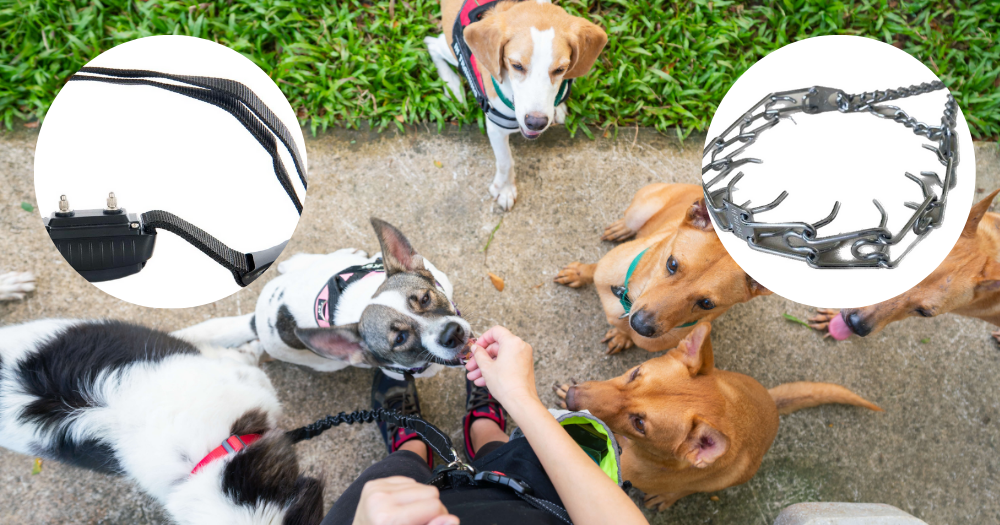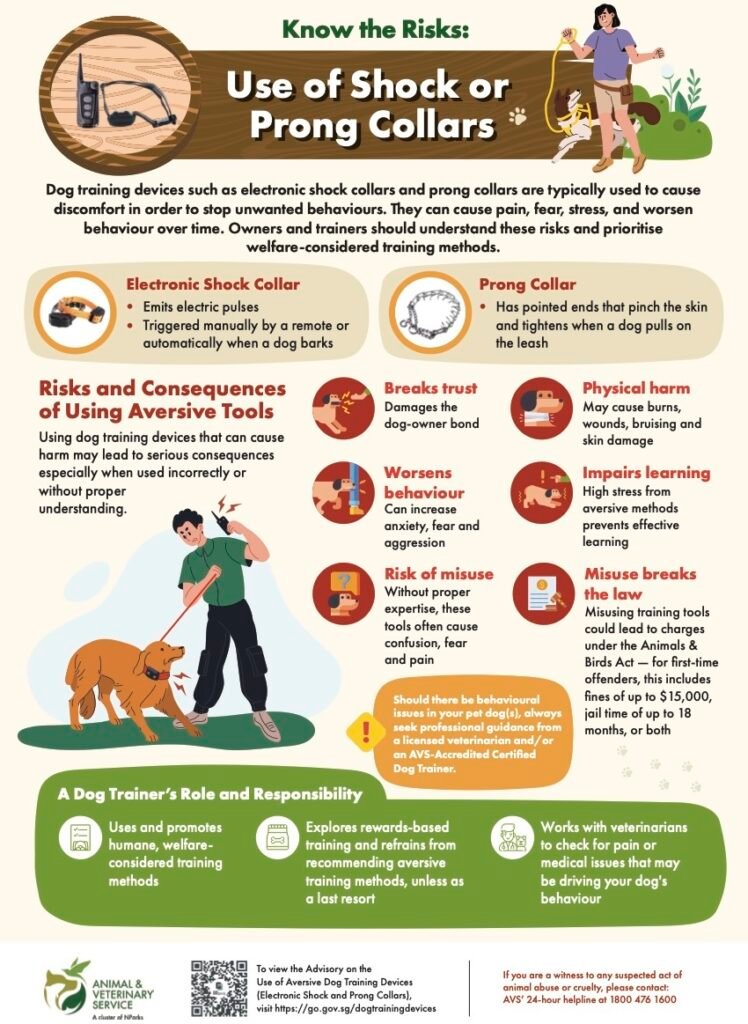Do you ever wonder what the best training methods are for your beloved dog? As a dog owner, you naturally want to provide the best care and upbringing for your furry friend. Recent discussions within the animal welfare community have highlighted the importance of using humane training methods. In Singapore, the Animal & Veterinary Service (AVS) and the Society for the Prevention of Cruelty to Animals (SPCA) have issued a new advisory that could significantly impact how you approach dog training.

This image is property of static.mothership.sg.
The Advisory’s Key Message
Starting July 26, 2025, the AVS and SPCA have strongly discouraged the use of aversive tools, such as shock and prong collars, in favor of more humane, reward-based training practices. This change reflects a growing understanding of dog behavior and the need for humane treatment, ensuring that dogs not only learn but also feel safe and content.
The overarching message is clear: using harsh training methods can lead to negative physical and psychological effects on dogs, and there are far better, more effective options available.
Understanding Aversive Tools
Aversive tools like shock collars and prong collars have gained attention for their controversial effectiveness.
-
Shock Collars: These collars deliver an electrical shock to your dog as a means of punishment for undesired behaviors. They come with various settings for intensity and duration, which can be activated manually or triggered automatically when the dog barks or crosses a designated boundary.
-
Prong Collars: These collars contain metal prongs that pinch the dog’s neck when the collar is tightened. Many handlers use them in attempts to suppress behaviors like excessive pulling.
Although these tools may have short-term benefits, the long-term consequences can be detrimental.
The Hidden Risks of Shock and Prong Collars
Using shock and prong collars can lead to a range of serious issues both for your dog and for you as the owner.
-
Physical Harm: The collars can cause pain, fear, and anxiety in dogs. Physical damage may include skin irritation, pressure sores, and burns.
-
Behavioral Issues: Rather than correcting unwanted behavior, these methods can lead to increased aggression. For instance, punishing pre-bite signals like growling can condition a dog to skip these warnings and go straight for a bite.
-
Emotional Impact: The emotional and mental well-being of a dog is crucial. Utilizing aversive training often leads to anxiety and distrust towards their owners, making it difficult for them to adapt positively to their environment.
In light of these issues, it’s clear why the AVS and SPCA are advocating against the use of these tools.

This image is property of static.mothership.sg.
Shift to Reward-Based Training
So, what is the recommended approach for you as a dog owner? The advisory suggests transitioning to reward-based training methods. These practices foster a positive environment where dogs learn through encouragement rather than fear.
Benefits of Positive Training
Reward-based methods have shown numerous advantages in training:
-
Builds Trust: By rewarding good behaviors with praise, treats, or toys, you strengthen the bond between you and your dog.
-
Improves Confidence: A positive atmosphere allows your dog to feel safe, thus boosting their confidence. This encourages them to explore and learn new commands or tricks without fear of punishment.
-
Easier to Implement: Learning to communicate effectively with your dog through rewards is often simpler than managing complex aversive devices. The clarity in expectations translates to better results.
-
Increased Effectiveness: Research shows that dogs trained with positive reinforcement are often more responsive and genuinely happier compared to those subjected to harsh training.
Steps to Effective Reward-Based Training
Adopting a reward-based approach can be simple and effective. Here are some steps for you to follow:
-
Identify Motivators: Determine what motivates your dog. It could be their favorite treat, a beloved toy, or even verbal praise. This will serve as a foundation for your training sessions.
-
Use Timing Wisely: Make sure to reward your dog immediately after they exhibit the desired behavior. This helps them to associate the action with the reward.
-
Be Consistent: Consistency is key in training. Use the same command words and signals to avoid confusing your dog.
-
Gradually Increase Difficulty: Start with simple commands before moving on to more complex behaviors. As your dog masters each skill, gradually increase the difficulty and offer rewards along the way.
-
Stay Patient: Learning takes time, and each dog progresses at their own pace. Celebrate small victories to keep the training positive.

This image is property of static.mothership.sg.
Seeking Professional Help
If you find yourself struggling with your dog’s behavioral issues, remember that professional help is available. Consulting an AVS-accredited dog trainer can provide you with tailored advice and strategies that cater specifically to your dog’s needs.
When to Consult a Veterinarian
Sometimes, behavioral problems can stem from underlying medical conditions. If your dog suddenly changes its behavior, a veterinary assessment is a wise first step. By ruling out health issues, you can focus on appropriate training methods without worrying about hidden medical complications.

This image is property of static.mothership.sg.
Future of Dog Training in Singapore
The advisory from AVS and SPCA is part of a proactive approach to improving animal welfare and training standards within the dog training industry.
Focus on Awareness and Education
Starting this July, the focus will shift towards raising awareness about humane training methods:
-
Outreach Programs: A new school outreach program will educate secondary school students on canine behavior and humane training techniques, preparing the next generation to treat animals with compassion.
-
Continuous Research and Discussion: The Dog Training Standards Workgroup will persist in evaluating training regulations and seeking the input from a diverse set of stakeholders, ensuring that the norms are aligned with modern animal welfare standards.
Legal Implications for Misuse
If you discover that someone is misusing training tools, you should know there can be serious repercussions. Under Singapore’s Animals and Birds Act, you can face severe penalties. First-time offenders can face fines of up to S$15,000, jail time for up to 18 months, or both.
Your Role in Promoting Change
As an engaged dog owner, you have a vital role to play in challenging the status quo. Choose to be a voice for humane training and share your understanding with others in your community. Consider discussing these topics with fellow dog owners or participating in workshops that promote positive training methods.

This image is property of static.mothership.sg.
Conclusion: Embracing a New Era in Dog Training
The shift away from aversive training methods marks a significant advancement in the way we think about our relationships with dogs. By prioritizing humane practices, you not only contribute to the well-being of your pet but also help foster a more compassionate and understanding society towards all animals.
Celebrate Your Bond
Training doesn’t have to be a battle of wills. Celebrate the learning moments, and enjoy the process. With patience, consistency, and compassion, you can cultivate a loving relationship with your dog that lasts a lifetime. Your commitment to humane training will not only enhance your dog’s life but will ultimately lead to a more harmonious coexistence in your community.
You’re making a difference, one paw at a time. Isn’t it a wonderful journey to embark on?



